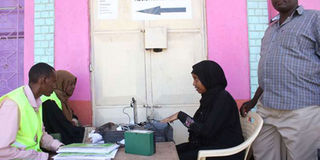IEBC warns against forcing people to register to vote

Voter registration goes on in Isiolo on January 18, 2017. PHOTO | PHOEBE OKALL | NATION MEDIA GROUP
What you need to know:
The commission warned that it was unlawful for politicians to deny Kenyans their rights until they prove they are registered voters.
IEBC communications manager Andrew Limo warned against the intimidation of new voters.
Over the past week, politicians have been pulling all stops to ensure their strongholds register as many voters as possible, including witholding services to unregistered voters in some government institutions and private businesses.
The Independent Electoral and Boundaries Commission (IEBC) has warned politicians against forcing Kenyans to register to voters during the ongoing process.
The commission warned that it was unlawful for politicians to deny Kenyans their rights until they prove they are registered voters.
IEBC communications manager Andrew Limo warned against the intimidation of new voters.
“As much as we appreciate our stakeholders’ gesture to mobilise citizens to vote, they should do so with sincerity and without intimidation. Voting is not compulsory in Kenya, neither is registration of the same,” he said.
Over the past week, politicians have been pulling all stops to ensure their strongholds register as many voters as possible, including withholding services to unregistered voters in some government institutions and private businesses.
Whereas some in the political class have become unusually philanthropic – even using their own resources to transport eligible voters to registration centres – some have resorted to crude and unorthodox means to ensure they register new voters.
Perhaps the most controversial of these tricks are the recent calls by two female MPs to women to deny their partners conjugal rights if they are not registered voters.
Mombasa Woman Representative Mishi Mboko urged fellow women to use sex as a weapon to raise the number of registered voters. Ms Mboko explained that it was a powerful weapon that could make reluctant men rush to registration centres.
But Ms Mboko is not the first politician to make such demands. In February last year, Nyeri Town MP Esther Murugi caused a stir when she asked women to withhold conjugal rights and food to partners who had not registered to vote.
NOT SERVED
In western Kenya, Vihiga Governor Moses Akaranga has made it clear that residents without voting cards would not be served by the county government.
“Anyone coming to seek services from any of our 10 departments will first have to show us that he is registered as a voter,” Mr Akaranga said, stirring strong reactions on the legality of such a move.
He said: “I have directed my officers to first check your registration status before attending to you. People who are not registered should do so from Monday when IEBC begins mass voter registration”,
Those who have not registered risk missing out on the Sh125 million county bursary scheme, Sh30 million fertiliser subsidy, issuance of land titles and survey services, and employment.
Individuals seeking waivers of hospital and mortuary bills, among other services, will also have to prove their registration status before being served.
He warned that it would be easy for his administration to check anyone’s registration status by sending a message to 22464, a number that has been provided by the electoral commission.
The latest craze by politicians to attract new voters has elicited an outcry from an international lobby group, which warned that some of the tactics being used were outright unlawful.
“These patterns of the use of undue influence and the use of force in registration of voters already point to a violation of one’s freedom of choice and a subsequent tacit condoning of voter intimidation that sets a dangerous precedent come the August 2017 General Election,” the International Policy Group warned.





